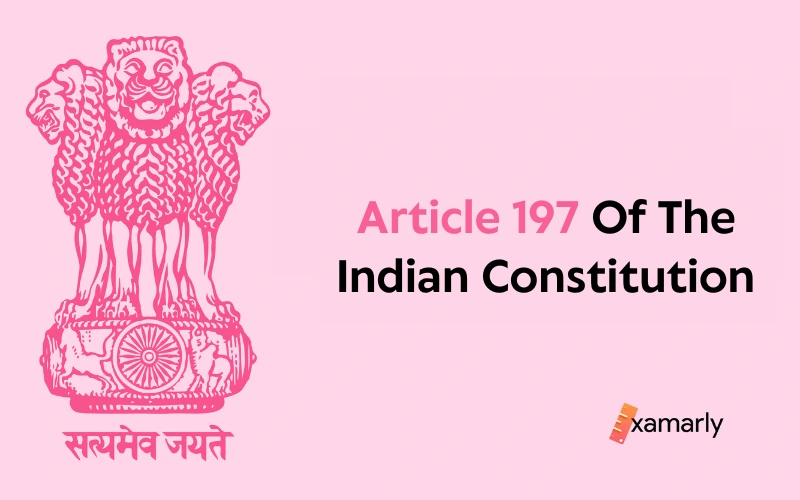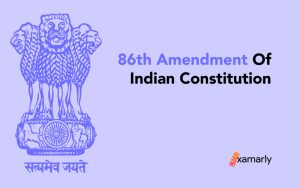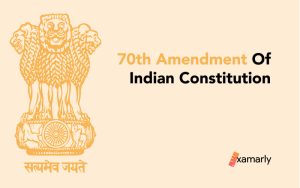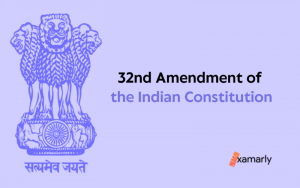An Overview
The Constitution of India grants certain rights and powers to the people of the nation as well as to the governing bodies of the government. There are multitude of articles that are a part of the Constitution of our country. They provide a variety of constitutional provisions for the effective functioning and administration of matters related to the nation and its people.
Article 197 of the Indian Constitution is one such article that holds special provisions within its clauses for the specific purpose of putting restriction on powers. It talks about limitations imposed on the authority of the Legislative Council. These limitations are with regard to approval of any Bills other than those pertaining to the Money Bills.
Get a clear understanding of Article 197 of the Indian Constitution through this article.
- An Overview
- Background Of Article 197 Of The Indian Constitution
- Article 197 Of The Indian Constitution: Related To The Limitations On Authority Of The Legislative Council
- Clause (1) of Article 197 Of The Indian Constitution: Explained
- Clause (2) of Article 197 Of The Indian Constitution: Explained
- Clause (3) of Article 197 Of The Indian Constitution: Explained
- Summing Up
- FAQs Related To Article 197 Of The Indian Constitution
- What Was The Draft Article For Article 197 Of The Indian Constitution?
- When Was Draft Article 172 Debated And Adopted Into The Constitution Of India?
- How Many Clauses Are There In Article 197 Of The Indian Constitution?
- What Do The Provisions Of Article 197 Of The Indian Constitution Intend To Do?
- Which Bill Is Excluded By The Final Clause Of Article 197 Of The Indian Constitution?
Background Of Article 197 Of The Indian Constitution
- Draft Article 172 was introduced in the Constituent Assembly for the purpose of finalising Article 197. It was introduced for discussion on August 1, 1949.
- The Chairman of the Drafting Committee offered an amendment to entirely substitute the Draft Article. This was thought of in order to make it possible for the Legislative Assembly to have the last say in instances where there is a divergence of opinion between the two Houses. This amendment served as the topic of discussion throughout the Assembly.
- Those in opposition of the suggested modification opined that the Legislative Council should be given more time to do its work. The proposal under consideration would make it more difficult for the Council to do its job.
- Another member countered that the Council was never meant to have equal powers with the Assembly. Rather it was meant to serve as a check on the Assembly and slow down the legislative process.
- There were also concerns raised that the Council’s review period was too short. Under sub-clause (1) (b) the prescribed time period for consideration before a bill would be sent back to the Assembly for final approval was not suitable.
- The Chairman of the Drafting Committee approved an amendment suggesting the extension of review period of a Bill from two months to three months under clause (1) (b).
- The Assembly voted to approve both of the proposed modifications. The revised Draft Article eventually became official as a part of the Indian Constitution on August 1, 1949.
Article 197 Of The Indian Constitution: Related To The Limitations On Authority Of The Legislative Council
Article 197 keeps a check on the powers rendered on the Legislative Council of a State. It does so by imposing a restriction on powers of the legislative body with regard to passing of any Bills except the Money Bills. This is the purpose of Article 197.
Further, it is divided into three clauses, namely- clauses (1), (2),and (3). Clauses (1) and (2) are further divided into three sub-clauses each, namely- clauses (a), (b), and (c).
The clauses and sub-clauses of this article have been quoted from the official document of the Constitution of India. Let us now try to analyse all of them closely and try to understand the provisions it provides in a clear and concise way.
Clause (1) of Article 197 Of The Indian Constitution: Explained
(1) If after a Bill has been passed by the Legislative Assembly of a State having a Legislative Council and transmitted to the Legislative Council—
(a) the Bill is rejected by the Council; or
(b) more than three months elapse from the date on which the Bill is laid before the Council without the Bill being passed by it; or
(c) the Bill is passed by the Council with amendments to which the Legislative Assembly does not agree;
the Legislative Assembly may, subject to the rules regulating its procedure, pass the Bill again in the same or in any subsequent session with or without such amendments, if any, as have been made, suggested or agreed to by the Legislative Council and then transmit the Bill as so passed to the Legislative Council.
The initial clause of the article states that suppose there is a Bill is passed by the Legislative Assembly of a State with a Legislative Council and then passed on to the Legislative Council, or the Vidhan Parishad. If in case that Bill gets rejected by the Council, then the Legislative Assembly, also known as the Vidhan Sabha may, keeping in mind the rules regulating its procedure, pass the Bill again in the same or any upcoming session. This could be done with or without any modifications, if there are any, as have been done, proposed, or approved by the Legislative Council, and then transmit the Bill as so passed.
The same would apply if after laying the Bill before the Legislative Council, it remains as not passed even after the passage of three months from its date of introduction. Another case would be when any Bill with certain revisions done to it has been approved by the Legislative Council but the Legislative Assembly does not approve of the changes made to the Bill.
Clause (2) of Article 197 Of The Indian Constitution: Explained
(2) If after a Bill has been so passed for the second time by the Legislative Assembly and transmitted to the Legislative Council—
(a) the Bill is rejected by the Council; or
(b) more than one month elapses from the date on which the Bill is laid before the Council without the Bill being passed by it; or
(c) the Bill is passed by the Council with amendments to which the Legislative Assembly does not agree;
the Bill shall be deemed to have been passed by the Houses of the Legislature of the State in the form in which it was passed by the Legislative Assembly for the second time with such amendments, if any, as have been made or suggested by the Legislative Council and agreed to by the Legislative Assembly.
The second clause of Article 197 explains that if any Bill is passed on by the Legislative Assembly for a second time and moved to the Legislative Council, then that Bill shall be considered to have been approved by the Houses of the Legislature of the State in the form as passed by the Legislative Assembly. This would include the changes or revisions made to the Bill, if any, by the decision of the Legislative Council along with the agreement of the Legislative Assembly, if at all the Bill in question is rejected by the members of the Council.
Likewise, the same would apply if after laying the Bill before the Legislative Council, it remains as not passed even after the passage of one month from the date of its introduction or the suggested modifications are made to the Bill and passed by the Legislative Council but without the approval of the Legislative Assembly.
Clause (3) of Article 197 Of The Indian Constitution: Explained
(3) Nothing in this article shall apply to a Money Bill.
The final clause of this article states that nothing mentioned in its provisions shall apply to a Money Bill. The above-mentioned provisions shall only be applicable in the case of Ordinary Bills.
Summing Up
To sum up everything that we learnt through this article, we can say that Article 197 of the Indian Constitution hold provisions for the laying down of a Bill in the Houses of the Legislature of a State and the process that is followed to either approve the Bill or to reject it.
Another important pint to be noted here is that none of the provisions provided by the clauses of this article is applicable in the case of Money Bills.
In this manner, this article tries to curb the authority of the Legislative Council by imposing a restriction on powers it exercises when it comes to any of the Bills except the Money Bills.
You Might Also Like:
| Article 196 Of The Indian Constitution | Article 195 Of The Indian Constitution |
| Article 194 Of The Indian Constitution | Article 193 Of The Indian Constitution |
FAQs Related To Article 197 Of The Indian Constitution
What Was The Draft Article For Article 197 Of The Indian Constitution?
Article 197 of the Indian Constitution was finalised from Draft Article 172.
When Was Draft Article 172 Debated And Adopted Into The Constitution Of India?
Draft Article 172 was debated and approved by the members of the Constituent Assembly and adopted on the same day itself. It was done
How Many Clauses Are There In Article 197 Of The Indian Constitution?
Article 197 of the Indian Constitution is composed of three clauses, namely- clause (1), clause (2), and clause (3).
Out of these, clause (1) and clause (2) have further been divided into several sub-clauses. Clause (1) has three sub-clauses, namely- sub-clause (a), sub-clause (b), and sub-clause (c). Likewise, clause (2) also has three sub-clauses, whose names are similar to the sub-clauses of the previous clause.
What Do The Provisions Of Article 197 Of The Indian Constitution Intend To Do?
The Provisions provided by the clauses of Article 197 of the Indian Constitution aim to regulate the power that has been accorded on the Legislative Council. This article of the Indian Constitution keeps a check on the authority of the State Legislative Council, or the Vidhan Parishad with respect to passing of any Bills excluding the Money Bills, by imposing restrictions on the body.
Which Bill Is Excluded By The Final Clause Of Article 197 Of The Indian Constitution?
The provisions of Article 197 of the Indian Constitution provided under clause (3), which is the final clause of the article excludes only the Money Bills from its scope of application.






